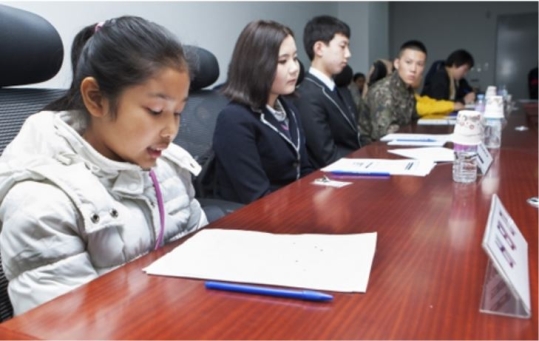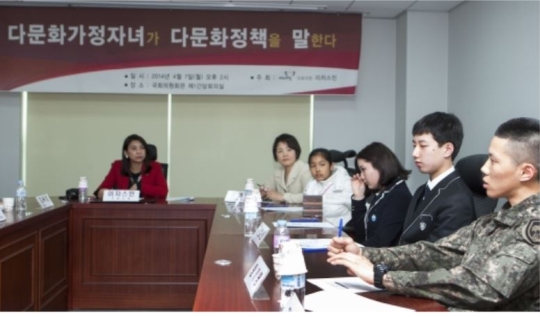“I did nothing wrong, but my friends tease about my skin color.”
“I am Korean, but my classmates think I am not.”

“A doctor told me that a child can become quasi-autistic if parents fail to provide stimulating activities and that my child, Jongjin, developed quasi-autism because my wife is a foreigner. Does this make sense at all? The doctor’s words hurt my wife so badly. She thinks it is her fault that Jongjin is sick,” said a 50-year old man Kim Jeongwon who lives in Hongcheon, Gangwon-do. While talking about his son, Kim let out his pent-up anger.
On April 7, during a public roundtable entitled “Children of multicultural families have something to say about policies on multicultural families,” held at the National Assembly Members’ Office Building in Yeouido-dong, Seoul, children born into multicultural families discussed discrimination and prejudice they experienced.
According to the Ministry of Security and Public Administration, in Korea, the number of children born to parents of mixed heritage is 191,328 as of 2013, 7.6 times greater than that of 2008. Though, currently, diverse nationalities and ethnic groups are represented in Korea, they are still discriminated against for many different reasons.
After Kim shared his story, lawmaker Jasmine added “When my daughter entered elementary school, her teacher suggested that my daughter gets a treatment because her linguistic development is slow, citing that I may be the reason.” The implication was that Jasmines’ Korean may be poor because she is a foreigner. Such stories are often found among multicultural families.

A 12-year old Burtema who attends Seoul Gwangjin Elementary School said “I am Korean, but my classmates think I am not.”
“Though both of my parents are from Bangladesh, I only speak Korean. I know nothing about the Bengali language. However, my friends make fun of me because my skin is darker than theirs. They swear at me and laugh behind my back. I did nothing wrong to them.”
She added “It has been quite tough doing homework because my parents are not fluent in Korean. These days, however, a Mongolian tutor from diverse ethnic backgrounds help me do my homework."
“Ever since I fell victim to school violence in middle school, I have had counseling and therapy treatment for about a year. However, I am still nervous that I might bump into perpetrators,” commented a 17-year old Ahn Hyoshin who lives in Hongcheon, Gangwon-do.
A 19-year old Hollang who goes to Seoul Dasom High School for Multicultural Children said in tears “With my parents gone, I don’t know what to do for the future and how to acquire a Korean citizenship or extend my visa." Born in Mongolia, Hollang moved to Korea three years ago.
When parents are undocumented, their children ‘do not exist’ on papers. In such cases, children can’t receive basic medical care, go to school, and issue a public transportation card.
Jasmine pointed out “Many of these children are deprived of their basic rights, suffering from discrimination and bias.” Since existing laws do not cover undocumented children aged 19 or under, she will propose a ‘Framework Act on Guaranteeing Basic Rights of Immigrant Children’ in the first half of this year.

